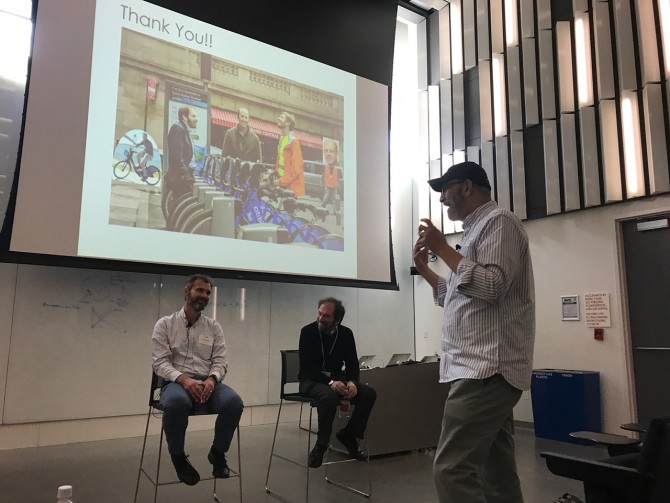Tech panel talks about the brave new frontier of NYC transportation
By Jon Craig
For those who once felt like dinosaurs in operations research, the resurgence in competitive taxi and bike-sharing apps has opened up a new frontier in competitive business.
That was the consensus April 21 when three transportation titans with ties to Cornell detailed their excitement and predictions for the rapidly changing transit industry.
During a panel discussion on “Transports of Delight: Cornell Drives Innovation in Shared Transportation” at Cornell Tech’s Roosevelt Island campus, professors who work part time for ride-share and bike-share companies wowed more than 100 students with statistics on peak use and growth trends in an industry that also is reducing the world’s carbon footprint.
Jay Walder, CEO of Motivate and former chairman of the Metropolitan Transportation Agency, pointed out that 600 miles of subways were constructed in New York City from 1904 to 1939. Only three new miles of subways have been built there in the past 50 years, he said.
Peter Frazier, associate professor in Cornell’s School of Operations Research and Information Engineering, who also works part time for Uber, said, “Ride sharing is only continuing to grow.”
Engineering studies and statistics are important to figuring out rider patterns and peak efficiencies according to Frazier and Garrett Ven Ryzin, professor of operations, technology and information management at Cornell Tech and a part-time employee at Lyft. (Lyft was founded by Cornell graduate John Zimmer ‘06.)
Frazier and Van Ryzin said there are emerging trends in monitoring ride-sharing, such as back-to-back trips and trip swaps that reduce ride share travel times and make business more profitable. An estimated 6.2 million gallons of fuel can be saved by maximizing ride shortcuts, it was reported, but the savings relies on traditional operations research methodology.
“It’s a wonderful time to be doing the kind of work we do,” Frazier said. “Cornell Operations Research and Information Engineering is playing a big role in solving these problems. I am really proud of all the work Cornell folks have done at Uber.”
Van Ryzin, who joined Cornell Tech in July 2017, said, “This is a golden age for OR (operations research) people. ... There’s a huge demand.”
Addressing an entirely separate – but also environmental friendly – mode of transportation was David Shmoys, the Acheson/Laibe Professor of Business Management and Leadership Studies. Shmoys said New York’s Citibike ride share program averages more than 2 million rides in a good month. Ridership has risen from 10 million in 2015 to 14 million in 2016 to 17 million rides last year, Shmoys said. New Yorkers share about 12,000 bikes at 700 storage stations.
The largest challenge, Shmoys said, has been making sure the stations have an adequate number of bikes at peak use times – and that stations don’t run out of stalls at peak drop-off times. (The reshuffling of bikes using trucks is a costly component of the program.)
“It’s really, really wonderful to ride these bikes,” said Walder, who founded his own bike-sharing company and is now leading progress in incorporating electric bicycles.
One glitch identified by the Cornell researchers comes when independent drivers chose to work for both Uber and Lyft. Not only does this mess with car availability (the driver may shut his/her cellphone off while working for one of the companies), but it can cut into estimated pickup times and the efficiency of shared rides, inevitability fouling up OR statistics.
Jon Craig '80 is a writer based in New York City.
Media Contact
Get Cornell news delivered right to your inbox.
Subscribe

